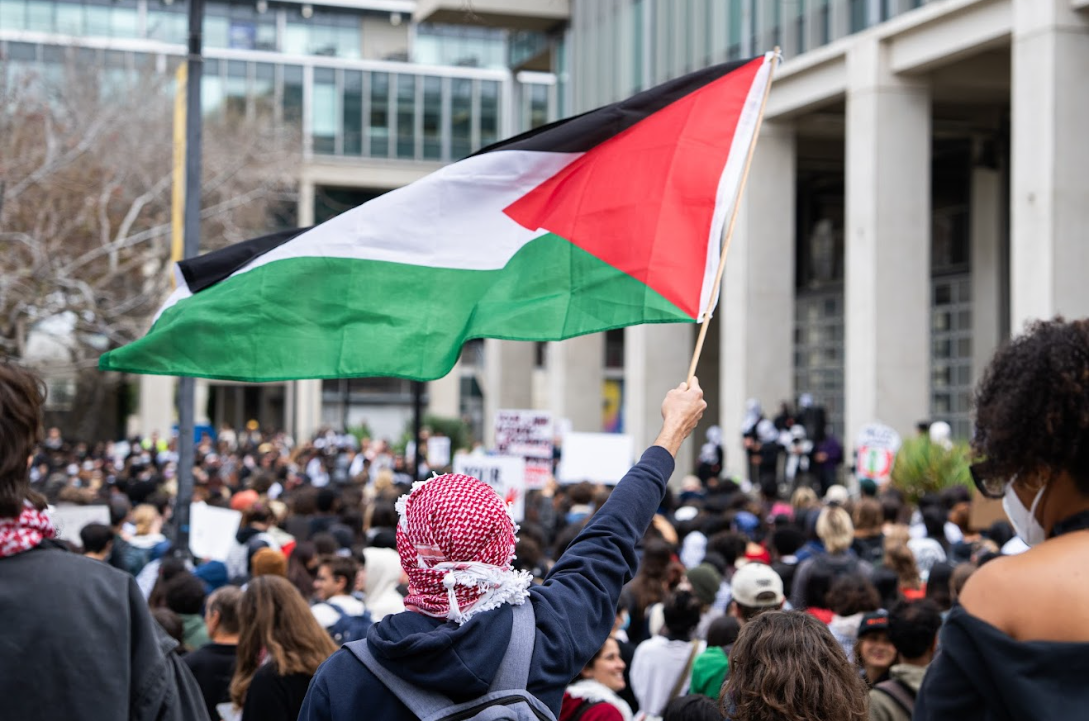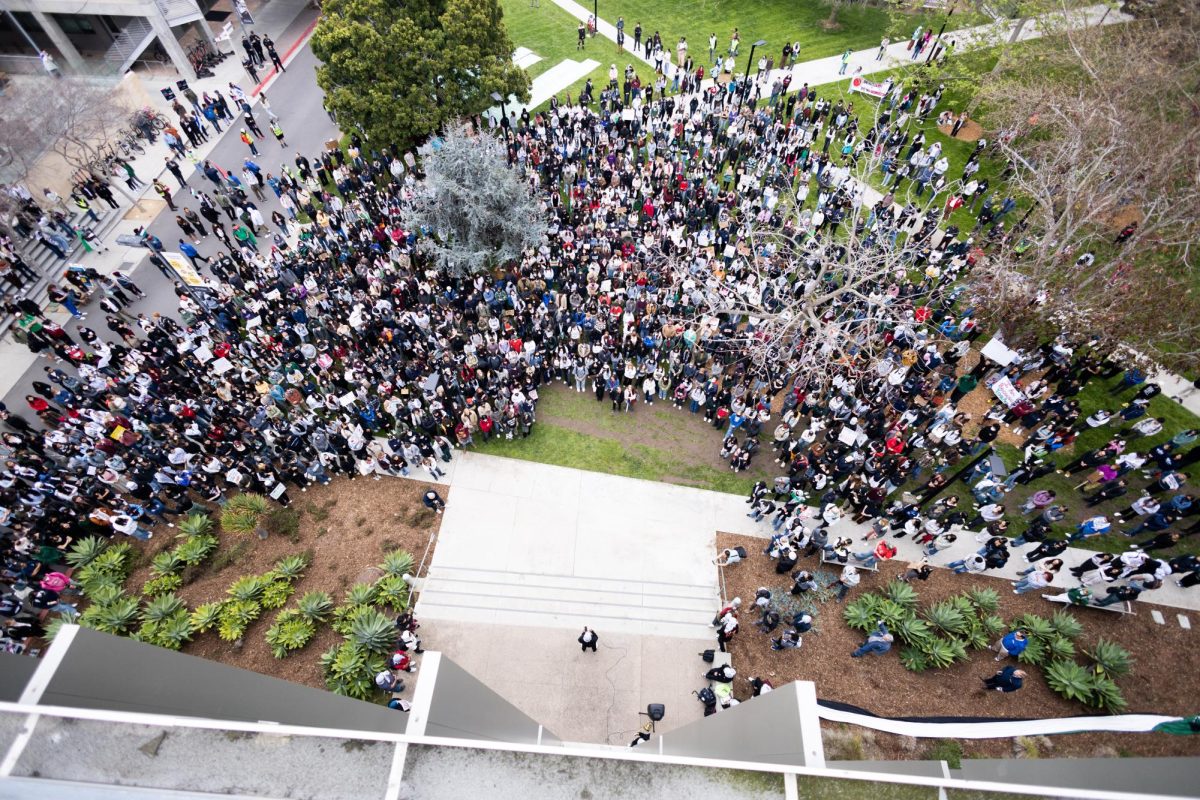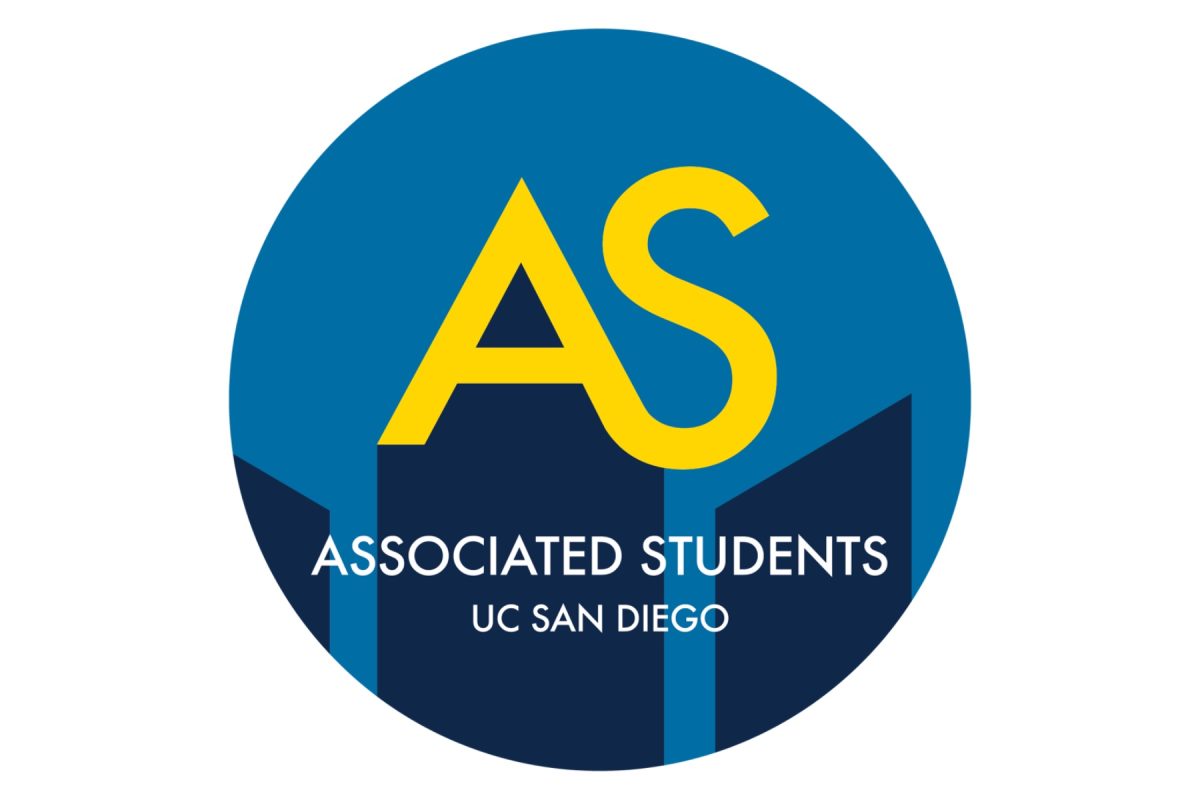Students, faculty, and community members rallied in Matthews Quad on March 6 to support UC San Diego’s Students for Justice in Palestine chapter and their proposal of an Association-Wide “Boycott, Divestment, and Sanctions” resolution regulated by a newly-chartered human rights committee to the A.S. Senate. The 27-2-3 vote led to the passage of the bill, sponsored by CPO Eng, with a three-fourths approval from the Senate. UCSD is the fifth UC to decide to divest, following UCSC, UC Davis, UC Riverside, and UCLA.
The rally, promoted by SJP’s social media as “the biggest protest in UCSD history,” gathered an estimated 2,500 attendees. A turnout of this degree is unprecedented, even by the anti-Vietnam War student demonstrations in the 1960s and 70s.
On the eve of the protest, UCSD Admin Records sent a university-wide Community Alert Bulletin email announcing a “larger-than-usual security presence” around campus and the availability of security escorts to maintain “peace and safety.”
At 3 p.m. the rally began with a series of speeches by unidentified representatives from SJP and the various student organizations in attendance, ranging from the Black Student Union, the Movimiento Estudiantil Chicanx Por Activismo, and Jewish Voices for Peace. Counter-protesters chanted from afar, towards the back of the rally.
“[Being here] today reminds us of our strength, of the embroidery of each of our communities which stitch us all together, we are one. This is what power looks like. This is what solidarity is,” a MEChA member spoke. “MEChA stands with SJP just as Latinxs for decades have stood with their Palestinian siblings. And our job today, as we make up almost 25% of this university, is to no longer allow our tuition to fund genocide.”
“For too long, our cries for justice have fallen on deaf ears. But today, we say enough is enough. Today, we say ‘no more’ to complicity in genocide. Today, we demand divestment,” a SJP member added.
SJP’s divestment bill reflects the efforts of a nonviolent global campaign initiated by the Palestinian BDS National Committee, aiming to end economic partnerships with corporations on-campus actively supporting Israel, such as Burger King. The BDS resolution aimed at divesting $8.2 million from the A.S. Senate’s budget, built on student fees and currently used to invest in corporations listed in SJP’s approved Policy of Ethical Spending. The resolution further focused on encouraging the UCSD community to boycott targeted companies. The Special Committee on Human-Rights Advisory was chartered within the bill.
“SJP wants to establish a Human Rights Committee [SCOHRA] to serve as a conduit for all of you to bring your concerns to Associated Students,” a SJP member, identified under the pseudonym Sophia Santana, continued.
“The students united will never be defeated,” the crowd responded.
Concluding the speeches, Santana called for a moment of evening prayer. The gathered crowd cleared a path from the stage to the quad’s grass area, where over 30 demonstrators took to prayer mats. Per Santana’s request, protestors created a wall around the individuals to ensure their safety. A moment of silence ensued the prayer.
“Use this moment to remember the 30,000 lives that have been lost,” a SJP representative said. “Let us remember all the innocent children who cannot live to see another day. Let us recenter [ourselves] and remember what we are doing this for and who we are doing this for.”
As the march commenced, it started raining. SJP provided a large Palestinian flag for protesters to hold over their heads.
The crowd, spanning more than a quarter of a mile, began moving towards Library Walk while chanting, “Doesn’t matter rain or shine, we will free Palestine.”
“Invest in Humanity, Khosla,” signs read. The address follows Jan. 25’s UC Regents Meeting, where SJP representatives presented demands for divestment to the Chancellors present, concluding with the request for them to raise their hands as a symbolic form of condemnation against the killing of Palestinians. Khosla, along with other UC Chancellors, did not comply.
Demonstrators brought drums to accompany their protest. Some of the drums were watermelon-shaped, referencing the pro-Palestinian liberation movement’s adoption of the fruit as their symbol.
UCPD officers concentrated near the Student Health Center, in proximity to where Chabad at UCSD tabled on the rally’s route.
“I reached out to the UCPD [before the protest], letting them know we were going to be present. I do think [police presence] was necessary for the protest,” Chabad Rabbi Shmulie Cunin explained to The UCSD Guardian. “I didn’t know what would have happened, even with the police. We just wanted to stay safe, especially if I’m going to have the responsibility of telling my Jewish students they can come out [to campus].”
Students present at Chabad’s tent wore tefillin and chanted prayers. Protesters did not engage.
The crowd continued along the bike route towards Peterson Hall, reaching Sixth College’s upper lawn outside of the Arts & Humanities building.
“Just because our administrators are cowards does not mean we have to be,” UCSD’s Faculty for Justice in Palestine chapter commented to The Guardian. “The silence and inaction on campus by the majority of faculty and administrators has exacerbated students’ distrust of us as stewards of their educational experience, and it is crucial that we show up and take risks alongside the students to rebuild that trust.”
FJP was among the many campus-based organizations who marched in the rally and among the 28 collectives endorsing SJP’s legislative bill.
After approximately two hours, the rally circled back to Geisel Library, where speakers reflected on the march’s mission in front of the building’s Main Entrance. Behind them was a large sign reading, “We Won’t Rest Until UC Divests,” which hung for the duration of the march.
“I know our families have worked so hard for us to go to a school like UCSD,” one of JVP at UCSD’s founding members expressed. “And it makes me sick [seeing] my tuition being used to fund people dying. How is this controversial? It should not be considered radical to want a genocide to end. It should not be considered revolutionary to want children, babies, and innocent civilians to not be bombed.”
Santana spoke about the A.S. Senate’s Week 9 meeting scheduled to be held after the protest at 6 p.m., which she acknowledged was originally planned to be in-person but was switched over to Zoom following the university’s expressed safety concerns. She encouraged protesters in attendance to join the meeting and participate in the Senate’s Public Comment session to express their support of the divestment bill, which they would later be voting on as a ‘New Business’ item on the agenda.
After the rally’s conclusion, SJP members handed out “tool kits” guiding participation in the Senate’s Public Comment section, outlining possible speaker points, reinforcing SJP’s demands, and enforcing community guidelines for respectful contributions.
A watch party was held for the A.S. Senate’s meeting at the Cross-Cultural Center in Price Center. Over 80 individuals registered for the event.
The meeting began at 6 p.m. Over 30 speakers were registered on the Public Comment’s Speaker List, each with a speaking time of three minutes. The session’s original duration of 30 minutes was extended by a petition for an additional hour for commentary, where three representatives of JVP spoke along with various supporters of the rally, many of whom detailed their experiences as Palestinians.
“As a Palestinian who was born … and lived 18 years in Palestine, I can tell you countless stories about apartheid at the hands of the Israeli state,” an unidentified student detailed. “We don’t have running water for more than one day a week, we don’t have access to natural resources. [In 2014,] I witnessed the brutal murder of my friend, Nadim … at the hands of Israeli forces. Every dollar that goes to Israel and companies in the BDS list, including those in which our university invests in, kills more people like my friend Nadim, [which] could have killed me too. I stand here today as a testament to Palestinian resilience and the urgency of our actions [to divest].”
“You may think this won’t make a difference, but our campus can create change. This isn’t about anti-Semitism, this isn’t about race or religion, this is about humanity, colonization, apartheid, injustice, and most importantly the 2 million lives at stake and the 45,000 that have been unjustly murdered. There’s no excuse for the deaths that have happened over the past 150 days and there’s no excuse for your silence. UCSD, please divest now,” another speaker stated.
Individuals on the speaker list representing Tritons for Israel additionally addressed the BDS resolution at hand.
“Voting yes to this resolution will endorse bigoted values, further alienate and target the Jewish community on this campus, and make [A.S.] complicit in a campaign that has shown itself to be inherently racist and divisive,” a TFI member said.
Following the Public Comment period, Santana gave a 15-minute presentation on the implications of the proposed bill. According to Santana, a survey created and shared by SJP, titled “On Campus Establishments,” amassed over 1,200 student signatories and 36 student organizations supporting the call for A.S. Senate’s divestment from pro-Israel companies within UCSD. Factoring in the participating organizations, the bill received the most signatures in UCSD history. In regards to SCOHRA, Santana established its collaboration with A.S., calling on the AVP of Equality, Diversity, and Inclusion, the office overseeing the committee, the CFO, and three senators elected by the former and latter to hold the membership within the committee.
The committee’s main purposes are stated by the bill to “by no means … target any group of people based on identity of race, ethnicity, national origin, religion, gender, or sexual orientation.”
“There has never been more of a need to divest than now,” Santana concluded. “A lot of your student body wants to divest. We want to make it clear that we are going to continue working and coming back, given that this is something we are very passionate about. We implore you to vote yes, and say yes to creating positive change we want to see on campus.”
Campus-wide Senator Christina Marie Green preempted roll call voting by suggesting that senators refrain from an abstaining vote in the BDS bill.
“We were thrilled to see that the resolution passed overwhelmingly, which shows that our students’ eyes are wide open about the university’s complicity in Israel’s colonization of Palestine,” FJP said in an interview. “We wish our fellow faculty and administrators would catch up, but we aren’t waiting for them.”
The bill passed despite two ‘no’s from Revelle College Senator Madeline Mercado and Sixth College Senator Kabir Vats, and three abstaining votes from Warren College Senators Ivan J. Ramirez and Verina Leung and Eighth College Senator Prityush Singh Goraya. Goraya proposed friendly amendments to the bill that were ultimately not implemented.
“I met with SJP directly, along with the A.S. International Senator on Tuesday. Compromises [were made to] what was introduced to the Constitution [by SJP], [because it] was very abnormal [due to its] procedure; it contained some very specific details, which is typically not what happens with the Constitution,” Senator Ramirez said regarding his reasoning behind abstaining from the bill in an interview with The Guardian.
A.S. Senate’s approval of the bill comes after the previous Winter Quarter’s reaffirming of its 2013 “Resolution in Support of University of California San Diego Corporate Accountability through Divestment from Corporations Profiting from the Illegal Occupation, Siege, and Blockade of Palestine,” where a clause was added to specifically adapt it to the “‘Israel-Hamas’ war and its genocide of the Palestinians.”
The Senate vote is the second phase in SJP’s divestment plan. As an amendment to the Policy of Ethical Spending for the A.S. Constitution, the bill has undergone approval from the legislature, the A.S. Senate, and as of March 7, six out of eight of the college’s presidents. The latter’s ratification made the A.S. Senate’s divestment official.
“Our biggest plan is to divest from the military-industrial complex,” Santana said. “However, that is a $4 billion endowment. We can’t just go from zero to a hundred. [But now,] we have the momentum, we have the people to make it happen. It’s still building blocks, [though]. How can we expect the University to divest when we, the students, have not done so?”
Following the Senate’s decision, UC San Diego released a statement on UC San Diego Today, stating that “the resolution does not align with the position of UC San Diego, which like the University of California and the other nine UC campuses, has consistently opposed calls for a boycott against and divestment from Israel.”
Tritons for Israel similarly commented via their Instagram account, condemning the resolution for using the terms “apartheid” and “occupation” in a “wrongful and intentional manner,” resulting in an “[antisemitic] application of double standards, demonization, and delegitimization of Israel.”
Cunin said that the UC Regents should reject the Associated Students’ resolution because BDS is “illogical.” He hopes people call on the UC Regents to speak on behalf of the Israeli people, claiming that the last meeting did not give pro-Israel speakers an opportunity to express themselves.
A founding member of JVP commented to The Guardian, “Our needs are not centered. There is a lot of centering of Jewish pain in [the discussion of the conflict], and yes, Jewish people are a part of this conflict. But, we are not the center, we are not the ones being bombarded. Yes, we can be concerned about what is going to happen to the state of Israel after the ceasefire.”
“But, centering ourselves on campus, especially in the BDS revolution,” they continued, is not logical, as the Jewish community is not particularly targeted.
JVP at UCSD was founded this quarter as a community for left-leaning, anti-Zionist Jewish students seeking to take action against Israeli apartheid and the state’s genocide of Palestinians, as well as to foster a space for alienated Jewish identities. During JVP at UCSD’s first month on social media, unidentified individuals began creating fake accounts impersonating them.
SJP and FJP have also experienced backlash, yet they said that they felt particularly targeted by the UCSD administration.
“The presence of UCPD on campus was definitely coming out of a place of deeply-rooted racism. We’ve had multiple protests on campus, and we’ve never had any issues,” a SJP member said. “We have never given the administration any reason to believe there was a security threat.”
“In the face of calculated and legally questionable attempts to suppress free speech on our campus, our students created a space where faculty, staff, students, and community members could break through the fear and silence to speak loudly and proudly for a decolonized, liberated Palestine,” FJP said. “The students who continue to press forward under such conditions have our respect and remind us of the important role we must play as educators in this moment of bearing witness to the well-documented atrocities of genocide. It was a privilege and a duty to march alongside them.”
“[I will continue to be motivated] through my personal survivor’s guilt,” Santana said regarding her motivation to continue her work in SJP. “If my parents had chosen not to immigrate, that would’ve been my reality …These people don’t know whether tomorrow is promised, whether they’ll be hungry or safe in the next couple of days. I should be uplifting their voices; how do I expect others to uplift their voices if I’m not doing it myself, as a Palestinian? It’s been 75 years. I will use my academic knowledge to back their stories up and create change.”
“This is just the beginning, and Inshallah, God willing, we plan to do so much more,” Santana concluded. “We plan to pave the path to ensure everyone’s voices are heard.”










